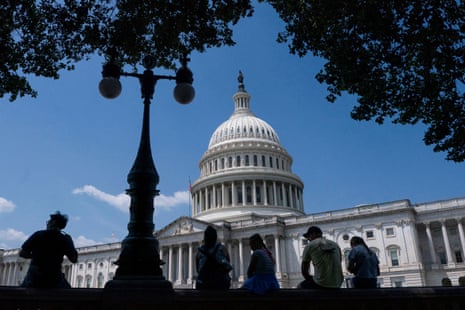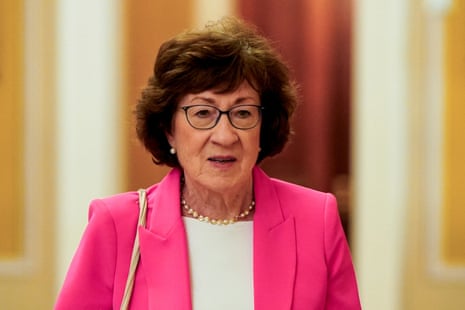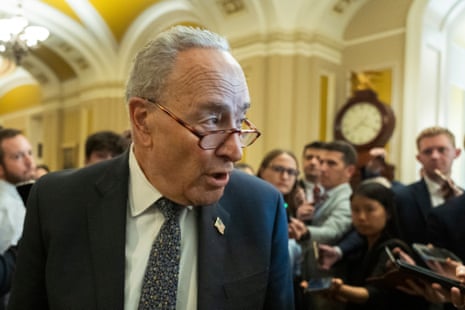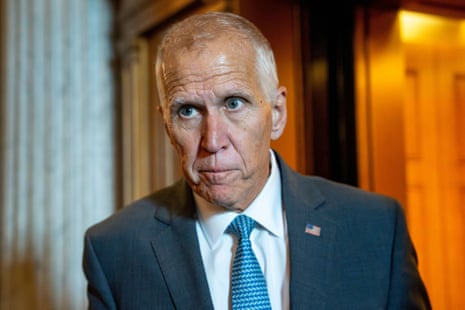US Senate votes on amendments to Trump's 'big, beautiful bill'
Good morning and welcome to our live coverage of US politics and the second Trump administration.
The US Senate is holding a marathon vote on a sprawling budget that is vital to Donald Trump’s agenda and would see sweeping tax breaks and cuts to healthcare and food programmes if passed.
Senators have convened at the Capitol for a process known as “vote-a-rama”, in which lawmakers will propose amendments to the legislation over what is expected to be many hours.
Democrats say the bill’s tax cuts would disproportionately benefit the wealthy at the expense of social programs for lower-income Americans.
The One Big Beautiful Bill Act (yes, it is formally called this) is expected to add an estimated $3.3tn to the national debt over the next decade. Republicans are rushing to pass the bill Trump’s self-imposed deadline of 4 July.
Republicans - who control both chambers of Congress and are generally loyal to Trump - are heavily divided over how deep welfare cuts should be in order to extend tax breaks in the legislation.
It is about 2.30am in Washington and it has been over 16 hours since voting began. We are expecting a result in around two and a half/ three hours time. Stay with us for all the latest developments.

In other news:
-
Tech billionaire Elon Musk, who spent more than a quarter of a billion dollars in support of Trump’s candidacy, has pledged to found a new political party he called the “America Party” and support candidates who did not back the budget bill in future elections.
-
The Senate parliamentarian found that Republicans can include a provision that would block Medicaid funding from Planned Parenthood in the “big, beautiful bill”.
-
Trump signed an executive order overturning sanctions on Syria today and issued a memorandum on US policy toward Cuba.
-
The Trump administration sued the city of Los Angeles over policies limiting city cooperation with federal immigration authorities, continuing a confrontation over Donald Trump’s aggressive deportation efforts in the largely Democratic city.
-
The Trump administration informed Harvard University that its investigation found that the university violated federal civil rights law over its treatment of Jewish and Israeli students, putting its federal funding further at risk.
-
Trump will host Israeli prime minister Benjamin Netanyahu at the White House on 7 July.
-
Trump wrote to Fed chair Jerome Powell again urging him to lower interest rates.
Key events Show key events only Please turn on JavaScript to use this feature
Eric Holthaus
A brutal stretch of severe weather has taxed communities on the eastern fringes of tornado alley this spring and early summer, while harsh staffing cuts and budget restrictions have forced federal meteorologists to attempt to forecast the carnage with less data.
As of 30 June, there have already been more than 1,200 tornadoes nationwide.
More than 60 people have died due to this year’s tornadoes, most of which have centered on the Mississippi River valley – about 500 miles east of the traditional heart of “tornado alley” of Kansas, Oklahoma and Texas. That unusual eastward shift may also be making tornado outbreaks more dangerous, bringing them in closer proximity to more people than the relatively sparsely populated plains states.
In addition to the tornadoes, it’s also been a burdensome year for flash flooding.
On 14 June, more than three inches of rain fell in just half an hour in West Virginia, washing away a young boy and prompting frantic emergency rescues across two counties in the northern part of the state. According to National Weather Service statistics, rainfall that intense could only be expected to happen about once every thousand years in a stable climate.
As the weather has worsened, there have been fewer federal scientists to alert the public of it.
Stanford University will cut $140m from its budget, citing ‘federal policy changes’
Cecilia Nowell
Stanford University will cut $140m from its budget in the coming academic year, citing “consequences from federal policy changes” including “reductions in federal research support and an increase in the endowment tax”. The news came in a letter Jon Levin, the university president, and Jenny Martinez, the provost, sent to faculty and staff last week.
The budget cuts will likely necessitate staff layoffs, deepening the impact of a staff hiring freeze the university announced in February. The university will continue hiring faculty, “although the pace may be somewhat slowed”, Levin and Martinez wrote. The cuts exclude the School of Medicine, which will make its own budget reductions.
“We believe deeply in the value of universities, in federal support for basic research, and in the endowment model that underpins financial aid and graduate fellowships. We will continue to advocate for these things,” Levin and Martinez said. “At the same time, we need to be realistic about the current landscape and its consequences.”
You can read the full story here:
The US national debt sits at $36tn, according to the treasury department. Trump’s budget bill will add an estimated $3.3tn to that debt, something so-called fiscal Conservatives are finding difficult to accept.
The bill contains a $5tn debt ceiling increase. The debt ceiling is a cap on the total amount the government can borrow.
As Reuters reports, the failure to pass some version would present lawmakers with a serious deadline later this summer, when the treasury department could come close to exhausting its borrowing authority and thus risk a devastating default.
The debt limit increase has caused Senator Rand Paul of Kentucky to come out in opposition to the bill.
Speaking to reporters on Monday, Paul, who represents Kentucky, said:
We have never raised the debt ceiling without actually meeting that target. So you can say it doesn’t directly add to the debt, but if you increase the ceiling $5 trillion, you’ll meet that.
And what it does is it puts it off the back-burner. And then we won’t discuss it for a year or two.

As we mentioned in the opening summary, Israeli prime minister Benjamin Netanyahu has said he’s going to Washington next week to meet with his close ally, US president Donald Trump, and other officials.
Speaking to a meeting of his cabinet, Netanyahu did not elaborate on the contents of his visit, except to say he will discuss a trade deal.
On Friday, Trump told reporters he believed a ceasefire in Gaza was close. Talks between Israel and Hamas have stalled over whether the war should end as part of any ceasefire.
Netanyahu, who is in the midst of a long-running corruption trial, has been accused of deliberately prolonging negotiations – and blocking their progress – to ensure his own political survival by having the assault on Gaza continue.

Beginning early on Monday and so far having run for roughly 19 hours, it remains unclear how long the voting in the marathon ‘vote-a-rama’ will last.
Republicans can afford to lose no more than three votes in either chamber to pass a bill the Democrats are united in opposition to.
If approved in the Republican-controlled Senate, Trump’s One Big Beautiful Bill Act will return to the lower House of Representatives, also Republican controlled, which passed its own version by a single vote at the end of May (215 to 214).
In the House, a full vote on the Senate’s final version of the bill could then come as early as Wednesday morning.
The senate has adopted an amendment offered by Republican senator Joni Ernst – who represents Iowa - to prevent jobless millionaires from claiming unemployment compensation.
Lawmakers voted 99-1 to strike the AI regulation ban from the bill by adopting an amendment offered by Republican senator Marsha Blackburn.
Republican Senator Thom Tillis, who announced his retirement on Sunday after voting not to proceed with the megabill, was the lone lawmaker who voted to retain the ban.
The Senate version of Trump’s legislation would have only restricted states regulating AI from tapping a new $500m fund to support AI infrastructure.
Major AI companies, including Alphabet’s Google and OpenAI, have expressed support for Congress taking AI regulation out of the hands of states.

Blackburn presented her amendment to strike the provision a day after agreeing to compromise language with Senate Commerce Committee chair Ted Cruz that would have cut the ban to five years and allowed states to regulate issues such as protecting artists’ voices or child online safety if they did not impose an “undue or disproportionate burden” on AI.
But Blackburn withdrew her support for the compromise before the amendment vote.
In a statement, the Tennessee Republican said:
The current language is not acceptable to those who need these protections the most.
Until Congress passes federally preemptive legislation like the Kids Online Safety Act and an online privacy framework, we can’t block states from making laws that protect their citizens.
US Senate strikes AI regulation ban from Trump megabill
The Republican-led US Senate has voted overwhelmingly to remove a 10-year federal ban on state regulation of AI from Trump’s mega bill, Reuters is reporting. More details soon…
Trump officials create searchable national citizenship database

Johana Bhuiyan
Johana Bhuiyan is a senior tech reporter and editor for Guardian US, based in San Francisco
The US Department of Homeland Security has for the first time built a national citizenship database that combines information from immigration agencies and the social security administration.
The database was created in collaboration with the “department of government efficiency” (Doge) in an effort to bridge the gaps between disparate information sources to make it easier to determine whether someone is a citizen, according to NPR, which first reported the details of the database.
The database is the result of an expansion of the systematic alien verification for entitlements (Save) program, made up of smaller databases within the homeland security department, and an integration with information from the Social Security Administration.
The centralized repository is searchable and can be accessed by state and local election officials to look up the names of anyone trying to vote to determine if they are citizens, according to NPR. Until now, election officials had to ask potential voters for documents verifying their citizenship or rely on a hard-to-navigate patchwork of databases.
You can read the full story here:
Some more news from the US senate now, where Republicans are – for the most part – still trying to pass Trump’s mega-bill.
Maine’s Republican senator Susan Collins has blamed Democrats for tanking her amendment to increase the bill’s rural hospital relief fund, saying they are “hypocrites” for championing themselves as protectors of Medicaid but then opposing her efforts to reduce the impacts of the legislation on rural hospitals.
“I was surprised at the hypocrisy of the Democrats on it, had they voted for it would have passed easily,” ABC News quoted Collins as having told reporters this morning.
Only two Democrats out of 22 senators supported Collins’ amendment, which would have seen the creation of a new top marginal tax rate used to double the size of the proposed rural hospital relief fund from $25bn to $50bn.
Collins added:
They complained repeatedly about the distribution in this bill of Medicaid cuts, hurting individuals in rural hospitals and tax cuts being extended for people who are wealthy. And yet, when we tried to fix both those problems, they took a very hypocritical approach.
Rural and smaller hospitals are at risk of bankruptcy because of the steep Medicaid cuts being proposed in the budget bill.

Musk vows to unseat lawmakers who support Trump’s bill and threatens forming an ‘America Party’ if it passes
Elon Musk has vowed to unseat lawmakers who support Donald Trump’s sweeping budget bill, which he has criticized because it would increase the country’s deficit by $3.3tn.
Musk wrote on his social media platform, X:
Every member of Congress who campaigned on reducing government spending and then immediately voted for the biggest debt increase in history should hang their head in shame!
And they will lose their primary next year if it is the last thing I do on this Earth.
A few hours later he added that if “insane spending bill passes, the America Party will be formed the next day”.

With these threats, lobbed at lawmakers over social media, the tech billionaire has launched himself back into a rift with the US president he helped prop up.
Since taking leave from his so-called “department of government efficiency”, or Doge, Musk has sharply criticized Trump’s budget bill, which he has said will undermine his work at Doge by increasing spending.
You can read the full story by my colleague, Maanvi Singh, here:
What are some key elements contained within the budget bill?
-
The Senate bill includes $4.5tn in tax cuts, according to the latest analysis from the congressional budget office, making permanent Trump’s 2017 rates, which would expire at the end of the year if Congress fails to act.
-
The Senate package would roll back billions of dollars in green energy tax credits, which Democrats warn will wipe out wind and solar investments nationwide.
-
It would impose $1.2tn in cuts, largely to Medicaid and food stamps, by imposing stricter work requirements, making sign-up eligibility more stringent and changing federal reimbursements to states. Medicaid provides government-sponsored health care for low-income and disabled Americans.
-
The bill would provide a $350bn infusion for border and national security, including for deportations, some of it paid for with new fees charged to immigrants.
Democrats vow to bring 'amendment after amendment to the floor'
Senate minority leader Chuck Schumer says Democrats will bring “amendment after amendment after amendment to the floor, so Republicans can defend their billionaire tax cuts.”
He said Democrats would offer amendments to “see once and for all if Republicans really meant all those nice things they’ve been saying about ‘strengthening Medicaid’ and ‘protecting middle-class families’, or if they were just lying”.

As the marathon session grinds into the early hours of the morning, some lawmakers are finding ways to relax or vent away from the heat of the chamber.
GOP senators took breaks from the Senate floor as well.
Republican US senator Tommy Tuberville, of Alabama, smoked a cigar on the Capitol terrace at sunset while other GOP senators took calls and chatted in rooms near the Senate chamber.
This weekend’s dramatic senate session saw a narrow 51-49 passing of a procedural vote on Saturday night to advance the budget bill and a forced reading of the 940-page bill by Democrats, a political manoeuvre that was deployed to stall its progress.
Two Republicans sided with Democrats in voting against opening debate, wanting to change parts of the contentious legislation.
One of these Republicans was the North Carolina moderate Thom Tillis, who said the package was a betrayal of Donald Trump’s promise not to withdraw healthcare from people, something he fears could happen if rural hospitals close. The other was Rand Paul of Kentucky.
The bill must now clear a formal Senate vote and be returned to the lower House for approval – which Trump wants done before a self-imposed Fourth of July holiday deadline.
As my colleague Chris Stein explains in this story, after Tillis declined to vote for the bill, Trump attacked him and the senator announced he would not stand for re-election next year, potentially improving Democrats’ chances of picking up the purple state’s seat.

US Senate votes on amendments to Trump's 'big, beautiful bill'
Good morning and welcome to our live coverage of US politics and the second Trump administration.
The US Senate is holding a marathon vote on a sprawling budget that is vital to Donald Trump’s agenda and would see sweeping tax breaks and cuts to healthcare and food programmes if passed.
Senators have convened at the Capitol for a process known as “vote-a-rama”, in which lawmakers will propose amendments to the legislation over what is expected to be many hours.
Democrats say the bill’s tax cuts would disproportionately benefit the wealthy at the expense of social programs for lower-income Americans.
The One Big Beautiful Bill Act (yes, it is formally called this) is expected to add an estimated $3.3tn to the national debt over the next decade. Republicans are rushing to pass the bill Trump’s self-imposed deadline of 4 July.
Republicans - who control both chambers of Congress and are generally loyal to Trump - are heavily divided over how deep welfare cuts should be in order to extend tax breaks in the legislation.
It is about 2.30am in Washington and it has been over 16 hours since voting began. We are expecting a result in around two and a half/ three hours time. Stay with us for all the latest developments.

In other news:
-
Tech billionaire Elon Musk, who spent more than a quarter of a billion dollars in support of Trump’s candidacy, has pledged to found a new political party he called the “America Party” and support candidates who did not back the budget bill in future elections.
-
The Senate parliamentarian found that Republicans can include a provision that would block Medicaid funding from Planned Parenthood in the “big, beautiful bill”.
-
Trump signed an executive order overturning sanctions on Syria today and issued a memorandum on US policy toward Cuba.
-
The Trump administration sued the city of Los Angeles over policies limiting city cooperation with federal immigration authorities, continuing a confrontation over Donald Trump’s aggressive deportation efforts in the largely Democratic city.
-
The Trump administration informed Harvard University that its investigation found that the university violated federal civil rights law over its treatment of Jewish and Israeli students, putting its federal funding further at risk.
-
Trump will host Israeli prime minister Benjamin Netanyahu at the White House on 7 July.
-
Trump wrote to Fed chair Jerome Powell again urging him to lower interest rates.

 2 months ago
33
2 months ago
33

















































